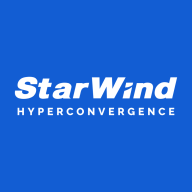


HPE StoreVirtual and StarWind Virtual SAN are competitive offerings in the storage solutions market. HPE StoreVirtual holds an advantage with its robust integration capabilities for compute, storage, and networking, making it a unified solution appealing for those within the HP ecosystem. StarWind Virtual SAN stands out with its cost-effective model, high availability feature, and the flexibility of hardware use, providing a compelling choice for users seeking affordability and simplicity.
Features: HPE StoreVirtual provides revolutionary platform integration, supporting VMware, Microsoft, and HP hardware, making the integration process seamless for users who want a single platform for various IT needs. It allows sophisticated management of storage through network RAID technology, providing options like RAID 10 to ensure data redundancy. Users appreciate the unified point of contact for support, reducing complexity in issue resolution. StarWind Virtual SAN's remarkable features include active-active high availability, allowing continuous uptime even when a node fails. Its synchronized virtualization enhances hardware flexibility while maintaining performance. The Virtual SAN software turns commodity hardware into high-performing shared storage, optimizing costs.
Room for Improvement: HPE StoreVirtual users call attention to complex licensing models, lack of SSD support, and looming end-of-life challenges, urging the need for a fresh integration strategy. Issues also arise with its management interfaces and stability compared to conventional SANs. For StarWind Virtual SAN, users suggest improvements in documentation clarity and wish for better disaster recovery features and licensing transparency to ease the setup and operational process.
Ease of Deployment and Customer Service: HPE StoreVirtual offers simplicity in on-premises deployment but receives mixed reviews due to slow response times despite having proactive customer service. StarWind Virtual SAN is lauded for its flexible deployment options, including both private and public cloud setups, and enjoys a reputation for excellent customer service with a dedicated support team that users find exceedingly knowledgeable and proactive.
Pricing and ROI: HPE StoreVirtual's pricing is variable, influenced by scaling needs and additional licensing for advanced features, stressing the importance of assessing true capacity requirements to manage costs. In contrast, StarWind Virtual SAN provides a straightforward node-based licensing model, deemed highly cost-efficient by SMBs due to its simple setup and absence of hidden fees. Both offer significant ROIs, though StarWind is noted for delivering more predictable cost efficiencies.
We don't sell a lot of redundant servers, so it's not a massive ROI, but the ability to rely on their technical support and the software's ease of setup allows us to reduce labor costs and go to market competitively.
I would rate them an eight out of ten.
When we set it up, they validate our settings and configurations to ensure we don't miss anything.
I believe that scalability should be further improved, especially considering the possibility that environments may grow exponentially.
In case there is any issue with any blade, the data is moved to another.
Its configuration should be easier.
A more intuitive interface or an improved dashboard for monitoring the cluster would also be helpful, as it would facilitate performance tracking and help identify potential issues before they affect services.
Having more visibility on what's actually happening when an error occurs would be beneficial.
We can plug in many blades, and we can have data up to one terabyte.
StarWind Virtual SAN helps us keep customer satisfaction and provides the solutions we need without having to hire many IT specialists.
Thanks to its seamless integration with Proxmox, the implementation of high availability servers has drastically reduced downtime, which is crucial for our security-focused company.



FlashBlade is the industry’s most advanced scale-out storage for unstructured data, powered by a modern, massively parallel architecture to consolidate complex data silos (like backup appliances and data lakes) and accelerate tomorrow’s discoveries and insights.
HPE StoreVirtual storage ensures that organisations can optimise the benefits of server virtualisation with cost-effective high availability and disaster recovery. The iSCSI-based, scale-out storage platform is easy to manage and change – meeting ongoing business demands without creating IT bottlenecks or application downtime. Overcoming the cost and management limitations of traditional storage area networks (SANs), HPE StoreVirtual nodes use storage clustering to form a single pool of resources that enable organisations to buy only what they need today, scaling non-disruptively to meet requirements in the future.
StarWind Virtual SAN provides high availability and fault tolerance for virtualized environments without the need for dedicated SAN hardware. It allows for real-time replication between servers, shared storage for Hyper-V clusters, and enables vMotion and High Availability features for VMware vSphere. The solution reduces costs and leverages existing hardware while providing a scalable and reliable infrastructure. Valuable features include ease of use, scalability, top-tier support, hardware agnosticism, and the ability to use off-the-shelf standard servers to increase storage space. StarWind VSAN has helped organizations improve performance, data availability, and data security while reducing downtime and providing cost-saving storage options.
We monitor all Software Defined Storage (SDS) reviews to prevent fraudulent reviews and keep review quality high. We do not post reviews by company employees or direct competitors. We validate each review for authenticity via cross-reference with LinkedIn, and personal follow-up with the reviewer when necessary.